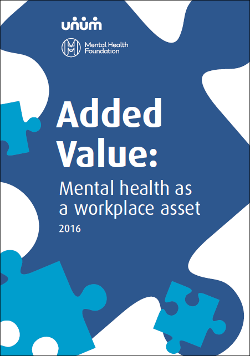Ungated Post | 30 Nov 2016
Added Value: Mental health as a workplace asset

This study, done in collaboration with the Mental Health Foundation, explores the experiences of people with mental health problems, assesses their contribution to the UK economy, and estimates the costs that mental health problems impose on the UK economy through foregone output.
As detailed in the Appendix, we found that people with mental health problems made up an estimated 15.9 percent of total employment in 2015. Of these, 75 percent worked in the private sector.
In 2015, people with mental health problems are estimated to have contributed £226 billion to UK GDP (12.1 percent the country’s economic output). That is nine times more than the cost of mental health problems to economic output: an estimated £25 billion in foregone gross value added the UK economy missed out on because people with mental health problems could not join the labour force, were less productive at work, took sick days off work, or required informal carers to leave the labour force.
Businesses should pay attention to the costs of mental health problems: an estimated £19 billion, or 76 percent, of the total foregone gross value added is estimated to affect the private sector.
Oxford Economics’ team is expert at applying advanced economic tools that provide valuable insights into today’s most pressing business, financial, and policy issues.
To find out more about our capabilities, contact:
Americas
Diantha Redd
+1 (646) 503 3052
Email
Asia Pacific
Peter Suomi
+65 6850 0110
Email
EMEA
Aoife Pearson
+44 (0)203 910 8054
Email
Related Services

Post
The Economic Footprint of JLR in the UK
This report examines the economic footprint of JLR in the United Kingdom in 2024. The analysis is conducted both at the national level, as well as on the West Midlands and North West regions, where JLR’s main facilities are located.
Find Out More
Post
Airbnb’s Economic Contribution to APAC in 2024: GDP, Jobs, and Regional Impact
Airbnb's platform connects hosts across Asia Pacific (APAC) with travellers from around the world. Oxford Economics was commissioned by Airbnb to quantify its economic footprint in 10 APAC markets in 2024.
Find Out More
Post
Economic Insights: Airbnb’s Contribution Through the Lens of Oxford Economics
Oxford Economics Australia delivered a tailored economic impact assessment for Airbnb, including GDP contribution modelling, job creation analytics, guest‑spend segmentation, and regional tourism dispersion insights to underpin Airbnb’s stakeholder communications and strategic growth initiatives.
Find Out More